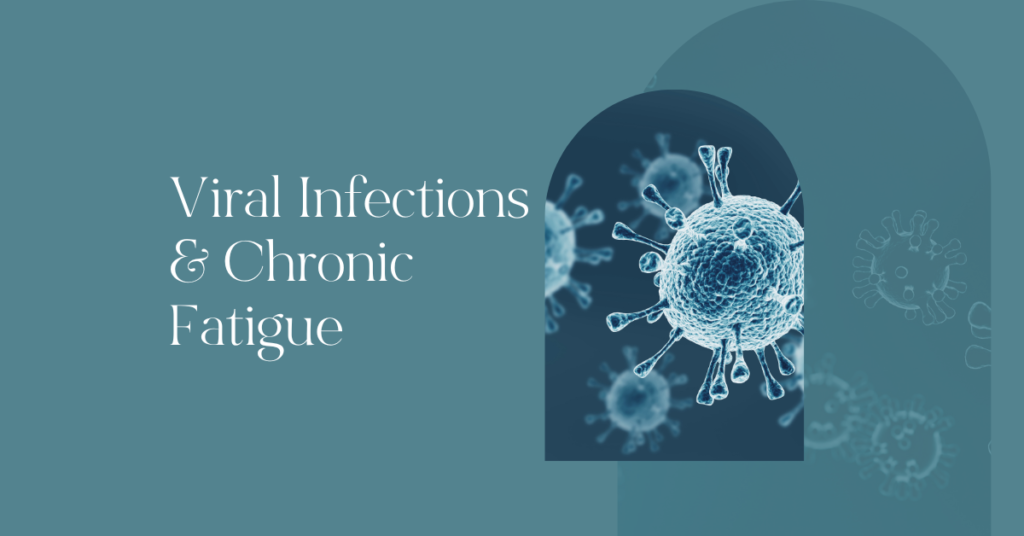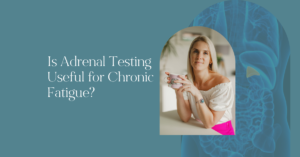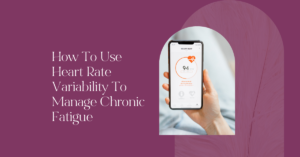Post-viral fatigue, reactivation of latent viruses and recurrent viral infections are three possible contributing factors that may be part of the complex chronic fatigue picture.
This blog will cover:
- The difference between post-viral fatigue, latent virus activation and recurring viruses
- Testing to identify if a virus could be impacting your fatigue / chronic illness picture
- How we support the body to overcome viral challenges
Post-Viral Fatigue Syndrome
If you have experienced a viral infection and never felt the same since, you may have been medically labelled or self labelled with Post-Viral Fatigue.
When a healthy person experiences an infection, they feel ill for a week or so and then they get better. But, when someone doesn’t recover properly after an acute infection there are 3 possibilities:
- There is an injury at the site of infection which may cause inflammation to a specific tissue or organ (see example on SARS-COV below)
- There can be activation of pre-existing inflammation which may cause systemic inflammation throughout the body. This may be where there is already systemic weakness e.g. primed microglia in the brain, irritable bowel disease, autoimmunity, asthma or arthritis
- There is potential for the onset of autoimmunity, known as pathogen induced autoimmunity, in those who are genetically susceptible, given the right environment.
Therefore, if you have never felt the same since an acute infection, you will want to consider which of these 3 scenarios applies to you, as this will shape how you support your body moving forward.
It is important to understand, that in most cases, there is no longer an active infection, the infection has been and gone but the changes created by the immune system to fight the infection may be long lasting for the body and additional support may be required to re-establish a better balance.
SARS-COV2 and Long Covid
The way that viruses work in general is that they can bind to certain cell surface receptors and this influences what tissues the virus can infiltrate and affect. Once a virus is bound to a receptor on a cell surface, nuclear proteins are delivered into the cell, where the virus hijacks the cellular machinery for its own replication.
The spike protein of SARS COV2 was/is able to bind to cell receptors known as the ACE2 receptors. ACE2 receptors are found throughout the body on multiple different organs including (see table below) and therefore, these tissues are susceptible to temporary and permanent damage.
| Organ | Symptoms Associated |
| Heart | Chest pain, myocardial inflammation, palpitations |
| Lungs | Chest pain, cough, dyspnea |
| Brain | Brain fog, fatigue, sleep disturbances, depression, anxiety, PTSD, OCS, delirium, neurological symptoms, cognitive deficits |
| Pancreas | Pancreatic injury, pancreatitis |
| Spleen | Decreases in T & B Lymphocytes, atrophy of lymphoid follicles |
| Liver | Liver injury, Increased liver enzymes AST, ALT |
| Blood Vessels | Inflammation, vessel damage, coagulopathy, microangiopathy |
| Kidney | Renal impairment, acute kidney injury |
| Gastrointestinal Tract | Diarrhoea, nausea, sore throat |
Recurring Latent Infections
Recurring Latent Infections are historical infections that a healthy immune system can keep in check. However, in moments of immune weakness and compromise, the host’s immune system may no longer be able to keep the infection in it’s latent state and it may reactivate.
A well known example of this Herpes Zoster. This is the virus responsible for varicella also known as chickenpox. Many children may have chicken pox as a child, but when this reactivates later in life, it is known as shingles.
Clinically, latent viruses reactivate when someone is severely immunocompromised. Common causes could be:
- Stress
- Microbiome imbalances due to diet, lifestyle, stress, drugs and alcohol
- Nutrient deficiencies
- Poor intake of protein and fat
- Hormone imbalances
- Inadequate sleep
- Chemical pollutants
- Other infections; parasites, yeast and mould
It may be tempting to want to tackle the virus specifically to improve symptoms but the bigger picture is understanding the factors that are wearing down the host’s immune system and supporting those.
Recurrent Viral Infections
Recurrent viral infections include repeated infections such as
- The flu
- SARS-CoV-2
- Rhinovirus (common cold, sinusitis, bronchitis)
- Adenovirus (conjunctivitis, upper respiratory, bronchitis)
- Norovirus (stomach flu)
- Rotavirus (diarrhoea)
- Parainfluenza virus (sinusitis)
- Respiratory syncytial infection (otitis media, common cold)
- Parvovirus (gastroenteritis)
It is normal for someone to experience these infections from time to time, feel unwell and then get better. However, when these infections are recurring and prevent someone from moving forward with their health, we must consider the state of the immune system, specifically, why this person is immune compromised.
What Tests Are Useful Here?
Testing For Acute or Active Infection
An acute infection can, but not always, be highlighted in a Full Blood Count (FBC). This is a standard panel that your regular doctor will be able to run for you. You can also use a private testing company such as Medichecks.
Markers that may be elevated in acute infection are:
- Increased white blood cell count
- Increased lymphocytes
If an infection has become chronic we may see:
- A low white blood cell count
- Increased neutrophils
- Suppressed lymphocytes
Infections may not always show up on a complete blood count so other testing options include:
- Complement proteins
- T cells
- B cells
- Natural Killer Cells
The best test for this is the Lymphocyte Map by Cyrex Laboratories (currently only available in the US). The next best options are with Armin Labs based in Germany.
Due to the hassle with testing, I seldom run these tests but tend to rely on the complete blood count, taking a detailed client health history and current symptoms.
IgG Vs IgM Antibodies
If you are experiencing a post-viral syndrome, the infection may have been and gone and, but provided you test for the appropriate infection, you may find IgG antibodies. IgG bodies will tell you that you had the infection (at some point in time), but they do not indicate a current infection.
It is noteworthy that:
- 53% of the population will have antibodies to herpes simplex virus
- 98% of the population have herpes zoster (chickenpox)
- 90% of the population will test positive for epstein barr virus (EBV)
However a positive result for IgM can suggest a reactivation of this latent virus.
Immunosciences offers a Comprehensive Viral Panel that will test for both IgG and IgM for:
- Cytomegalovirus (CMV)
- Epstein Barr Virus (EBV)
- Herpes Simplex Virus (HSV)
- Human Herpes Type 6
- Rubeola (Measles)
- Varicella zoster IgG (Chickenpox / Shingles)
Monocytes
Monocytes make up part of the Full Blood Count. An elevation in monocytes (>7%) can indicate the reactivation of herpes virus, including:
- Cytomegalovirus (CMV)
- Epstein Barr Virus (EBV)
- Herpes Simplex Virus 1 and 2 (oral and genial herpes)
- Varicella zoster (Chickenpox / Shingles)
There can be other reasons for elevated monocytes, therefore, this should also be associated with fever, fatigue, sore throat and muscle aches.
Autoimmunity
If you have experienced a persistent decline in health since experiencing a virus, it is worth considering and ruling out viral activation of autoimmunity.
The most accessible marker for autoimmunity is anti-nuclear antibodies (ANA), which may be offered by your regular doctor. However, although ANA may help facilitate the diagnosis of some autoimmune conditions, it may not be able to identify and rule out all types of autoimmunity.
A more favourable test would be the Cyrex Array 5, which is a Multiple Autoimmune Reactivity Screen. It tests for 24 different protein targets and therefore offers a more comprehensive picture of autoimmune potential. The test does retail at $671 and would need to be arranged through a qualified provider e.g. Nutritional Therapist or Functional Medicine Doctor in the UK.
Although not everyone has the resources for this type of testing, if your health is impacting your quality of life long term, getting to the bottom of your clinical picture is essential.
Support For Overcoming Viral Challenges
Antiviral therapies are commonly recommended as part of a fatigue recovery support plan, however, we must considering the following:
- In the case of post-viral fatigue, the infection may be long gone and therefore we may rather need to consider how we support the organ system impacted and /or infection induced autoimmunity. Antiviral therapy may not be helpful in this case.
- In the case of recurrent infections or the reactivation of latent infections, the host is most likely immune compromised and therefore we need a well rounded approach to support the immune system of the host, perhaps with some antiviral support.
Support For The Immune Compromised
When someone is immune compromised how we support them starts with how we support anyone who is experiencing chronic fatigue or a chronic illness. Is starts with basic foundations:
- Sleep
- Stable Blood Sugar
- Macro-nutrition; High quality diet with adequate protein intake (1g per pound of ideal body weight) and intake of essential fatty acids (omega 3 fatty acids)
- Micro-nutrition; vitamins ADEK, Iron, Copper, Zinc, Vitamin B and Vitamin C
- Optimal digestive health which we can encourage with things like probiotic, saccharomyces boulardii, short chain fatty acids and mucosal membrane support
- Optimal movement routine within capacity (see here & here for guidance)
- Nervous System Support
This may sound pretty basic and obvious but you would be surprised how many clients I see on complex supplement protocols who have not addressed these basic concepts. Just eating better, sleeping better, moving a little and supporting the nervous system can go a long way to improving immune function).
Additionally on a case by case basis we may want to consider:
- Adrenal Function
- Sex Hormones
- Chemical and toxin exposures (e.g. mould mycotoxins)
- Other ongoing infections e.g bacteria, parasites, yeast and mould
- Overtraining
- Smoking
- Drugs and alcohol use
- Eating disorders
Specific Support for Viral Infections
Once the basics are in place we can use the following to support the immune system further:
| Natural Killer Cells & T Cell Support | B Cells | Biofilm Disruptors |
| Astragalus Echinacea Lemon Balm Beta Glucans | Grape Seed Extract Adequate Protein Green Tea Pine Bark Extract Resveratrol | Oregano Curcumin Quercetin NAC Garlic Monolaurin Berberine Nattokinase |
Autoimmunity
If your symptoms are due to infection induced autoimmunity, the case becomes a lot more complex. It goes beyond the scope of this blog to go into more detail but generally speaking, here are some of the key principles that would need to be clinically managed:
- Identify the undiagnosed autoimmunity (Cyrex Array 5)
- Identify the stages of the disease e.g. silent, reactivity, disease
- Identify lifestyle triggers e.g. sleep, exercise and relationships
- Identify dietary protein triggers e.g. gluten, dairy, nightshades, lectins, gluten cross reactive foods, insulin surges
- Identify chemical triggers e.g. pollutants, toxins, chemicals, impaired biotransformation
- Identify antigen triggers e.g. virus, bacteria, parasite, mould
- Identify the breakdown of the immune barriers e.g. gut barrier, lung barrier, blood brain barrier, nasopharynx barrier
- Support immune tolerance e.g. distinguish, downregulate and diversify
- Have strategies that help to recover from flares










